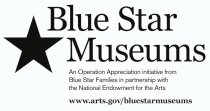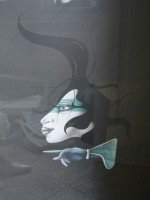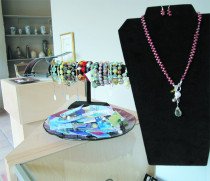
The Chapel: Fragment of Robert Sower's "Cathedral"
In August 2008, American Airlines gifted eight stained-glass panels that formed part of the famed massive abstract mosaic facade designed by Modern stained-glass master Robert Sowers for Terminal 8 at Idlewild Airport (now John F Kennedy Airport) in New York City. At the time of its 1960 installation until 1998, the Guinness Book of World Records documented the work as the largest stained glass window in the world, and it became a JFK airport trademark.
Widely considered America’s greatest stained-glass master of the Modern era, Robert Sowers combined artistic virtuoso with functionality in his design of the glass installation. Composed of over
30,000 red, sapphire and white glass tiles organized in 900 panes, the 317 foot by 23 foot translucent mosaic window provided aesthetic pleasure and insulation from the brutal punishment of
the sun on the south-facing wall. For half a century the work endured the beating rays of the sun, the sometimes caustic New York air, and the continual vibration of jet engines, and never
once leaked.The installation gained worldwide fame and made a bold international statement about the expansiveness and creativity of Modern American architecture. Artist and educator,
Sowers authored several books on the history of stained glass and how to understand the language of glass.
When American Airlines began construction of a new terminal in 2007, employee Eileen Vaquilar Clifford campaigned to save the Sowers Window as a single work of art. Yet, the size of the work and
the expense of removal and reconstruction proved prohibitive. In February 2008, MMoFA learned of the iconic window's fate, and contacted American Airlines with the desire to preserve
the legacy of Sower’s stained glass masterpiece in art history. American Airline removed, preserved and gifted 8 glass panels.
MMoFA is the only art museum in the US to presenve the Sowers window memory. Other glass panels are displayed at the American Airlines C.R. Smith Museum in Dallas and the Cradle of Aviation
Museum in Garden City, New York.











